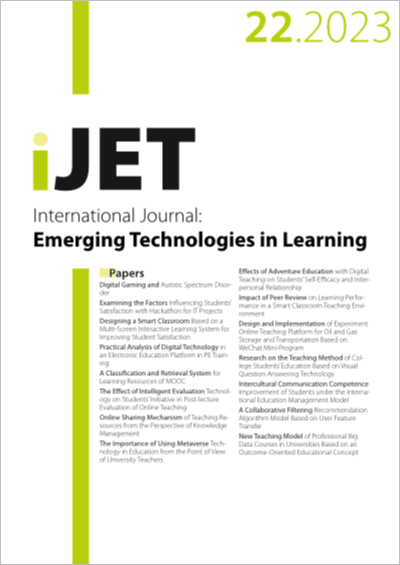The Effect of Intelligent Evaluation Technology on Students’ Initiative in Post-lecture Evaluation of Online Teaching
DOI:
https://doi.org/10.3991/ijet.v18i22.44849Keywords:
Intelligent evaluation technology, Online teaching, Evaluation initiative, Reliability, Validity, Online regression, Analysis of varianceAbstract
Class evaluation based on intelligent technology is a disruptive innovation and change. Strengthening research, developing key technologies in the education evaluation field, and effectively integrating intelligent technology in higher education evaluation are among the essential measures that can be taken to ensure the high-quality development of higher education. In this study, 352 undergraduates from Anyang Institute of Technology in Henan Province were invited to participate in a questionnaire survey. The influence of four aspects of intelligent evaluation technology (i.e., language analysis, behavioral analysis, emotion analysis, and teaching evaluation techniques) on the initiative of the students in the post-lecture evaluation of online teaching was analyzed. Differences in the initiative of the students in post-lecture evaluation under different frequencies of use of intelligent evaluation technology were measured. Results showed that the overall Cronbach’s α is 0.840 and the Kaiser-Meyer-Olkin value is 0.852, indicating that the questionnaire has very good reliability and validity. Language analysis, emotion analysis, and teaching evaluation techniques have a positive promotion effect on the initiative of the students in the post-lecture evaluation of online teaching. The frequency of use of intelligent evaluation technology after class has a significant influence on the initiative of the students in post-lecture evaluation at the 0.01 level (F = 5.073, p = 0.002). Moreover, the initiative of the students in post-lecture evaluation declines gradually as their frequency of use of intelligent evaluation technology increases. The research conclusions can serve as an important reference for education teaching evaluation mode reform, with artificial intelligence technological support; the interpretability of multidimensional indices (e.g., cognition, emotions, and input) for online teaching quality evaluation; and teaching quality evaluation under man–machine coordination.
Downloads
Published
How to Cite
Issue
Section
License
Copyright (c) 2023 Zhaona Wang

This work is licensed under a Creative Commons Attribution 4.0 International License.



